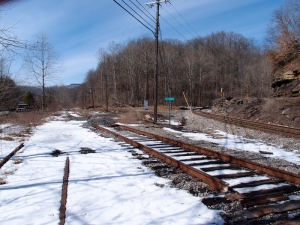Around the Dante VA area, from the turn of the last century to about the late 50s, the Clinchfield Coal Company, founded by George Carter, but later owned by Pittston, operated four coal mine areas in the hollows. The one we explored recently is at the head of Straight Hollow. There once was a 1912 adit, but it’s been overtaken by strip mining. There are still an extant 1914 and two 1955 adits, which you can see in winter, but not in summer, because kudzu. I’m posting them over at www.unclebobstravels.com. According to the USGS topo map (St. Paul), there was a narrow gauge railroad that hauled coal out of this mine complex down to a conveyor or loader nearer the railroad.
This is the eastern portal at roughly 36.99604, -82.27922

It’s been almost completely bermed up, but you can just see the top of the original entrance.
About 1,500 feet to the west is the other portal, also bermed up.

This old railroad line, with this tunnel and another further down toward Dante, which we couldn’t find, are clearly shown on the USGS/TVA St. Paul quad, 1935 issue.
